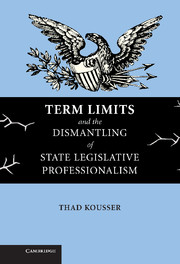Book contents
- Frontmatter
- Contents
- List of Figures and Tables
- Acknowledgments
- PART I THE MANY DESIGNS OF AMERICAN STATE LEGISLATURES
- PART II HOW DESIGN AFFECTS A LEGISLATURE'S FORM
- 3 The Stability of Leadership: How Long Does “First among Equals” Last?
- 4 The Role of Committees: Independent Actors or Agents?
- 5 Patterns in Legislative Achievement
- PART III HOW DESIGN AFFECTS A LEGISLATURE'S FUNCTION
- Appendix to Chapter 3
- Appendix to Chapter 4
- Appendix to Chapter 5
- Appendix to Chapter 6
- Appendix to Chapter 7
- References
- Index
4 - The Role of Committees: Independent Actors or Agents?
Published online by Cambridge University Press: 06 January 2010
- Frontmatter
- Contents
- List of Figures and Tables
- Acknowledgments
- PART I THE MANY DESIGNS OF AMERICAN STATE LEGISLATURES
- PART II HOW DESIGN AFFECTS A LEGISLATURE'S FORM
- 3 The Stability of Leadership: How Long Does “First among Equals” Last?
- 4 The Role of Committees: Independent Actors or Agents?
- 5 Patterns in Legislative Achievement
- PART III HOW DESIGN AFFECTS A LEGISLATURE'S FUNCTION
- Appendix to Chapter 3
- Appendix to Chapter 4
- Appendix to Chapter 5
- Appendix to Chapter 6
- Appendix to Chapter 7
- References
- Index
Summary
Committees are the aspect of a legislature's internal structure that has drawn the most interest from political scientists, for the longest time. Woodrow Wilson's 1885 Congressional Government observed that it was in these uncoordinated bodies that the work of Congress was done. Institutionalizing the division of labor in policy making, committees allow legislatures to “mold and transform proposals from whatever source into laws” (Polsby, 1975, p. 277). In a newsletter to his supporters, Congressman Clem Miller had this to say about the committee: “Here is where Congress does its job. Here is where congressmen work on each other endless, endless hours. Here is the heart of Congress” (Miller, 1962, p. 7).
Committees draw the attention of academics and politicians alike because they are often quite powerful. The sources and manifestations of their power are particularly interesting because committees may have policy preferences and priorities different from the legislature's general membership. Why and how would a chamber delegate authority to a subset of its members that had its own agenda? Many theories have been set forth to elucidate the role of committees. Most come from the U.S. congressional literature, which has produced very different theories that frequently seek to explain the same empirical patterns. The tradition was begun by Wilson's classic, updated through the hands-on research of Huitt (1961) and Fenno (1973) and revisited in the formal theoretic works of the last decade (notably in Krehbiel, 1991, and Cox and McCubbins, 1993).
- Type
- Chapter
- Information
- Publisher: Cambridge University PressPrint publication year: 2004



